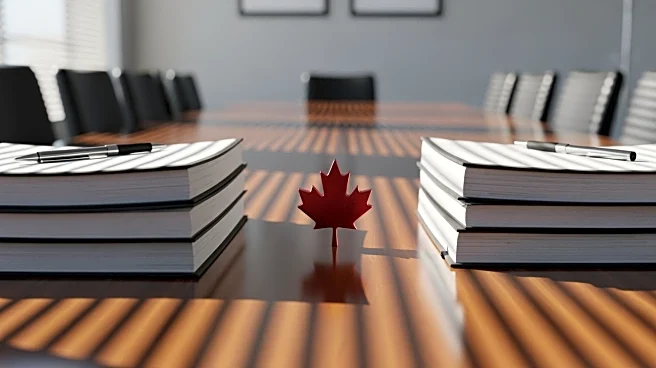What's Happening?
The U.S. Supreme Court is set to review the legality of tariffs imposed by President Trump, following a federal appeals court ruling that deemed most of these tariffs illegal. U.S. Treasury Secretary Scott Bessent has indicated that despite the court's decision, there are other legal avenues to potentially uphold these tariffs, such as the Smoot-Hawley Tariff Act. This act, historically considered one of the most catastrophic congressional actions, could be invoked to maintain the tariffs. The announcement of the court's ruling came after the market closed on Friday, leaving investors in a state of uncertainty as they await further developments. The situation reflects the ongoing volatility and complexity surrounding trade policies in Trump's administration.
Why It's Important?
The Supreme Court's decision on Trump's tariffs holds significant implications for U.S. businesses and international trade relations. If the tariffs are upheld, it could lead to increased costs for importers and potentially strain relations with trade partners like China. Conversely, if the tariffs are deemed illegal, it could provide relief to businesses affected by higher import costs. The uncertainty surrounding the tariffs may lead to cautious market behavior, impacting investment decisions and economic forecasts. Stakeholders in industries reliant on imports, such as technology and manufacturing, are particularly attentive to the outcome, as it could affect their operational costs and competitive positioning.
What's Next?
The Supreme Court's review of the tariffs is expected to be a lengthy process, with potential for further legal challenges and appeals. Businesses and investors are likely to adopt a wait-and-see approach, monitoring developments closely. Political leaders and trade organizations may also weigh in, advocating for or against the tariffs based on their economic impact. The decision could set a precedent for future trade policy and executive authority in imposing tariffs, influencing legislative and executive actions in the realm of international trade.
Beyond the Headlines
The legal battle over Trump's tariffs highlights broader issues of executive power and trade policy in the U.S. It raises questions about the balance of power between the presidency and the judiciary, and the role of historical legislation like the Smoot-Hawley Tariff Act in modern trade disputes. The case could prompt discussions on the need for updated trade laws that reflect current economic realities and international relations, potentially leading to legislative reforms.









